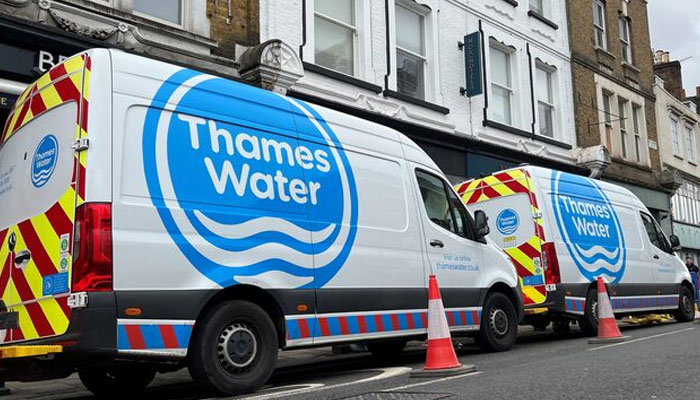Indebted UK water supplier proposes massive bill hike
LONDON: Britain’s largest water supplier Thames Water on Wednesday said it needs to massively increase what it charges customers, saying that spending cuts proposed by the industry regulator were “not tenable”.
The company -- dogged by financial troubles -- proposed a more than 50 per cent increase in bills over the next five years to finance what it says are “much needed” investments.
Regulator Ofwat has already rejected an initial proposition by the company to increase bills by 44 per cent by 2030, deeming that certain proposed expenses were “not well justified”.
And in its recommendations for water companies last month, Ofwat proposed capping bill hikes at 23 per cent over the next five years, and imposing spending limits. It will make a final decision in December, following a consultation.
Thames Water, which serves around 16 million homes and businesses in London and elsewhere in southern England, has been riddled with debt and has faced fines and criticism over failures to plug raw-sewage discharges in rivers.
Thames Water has now said that the proposed spending cuts would make it harder to attract investors.
Bills could rise by as much as 59 per cent by 2030, bringing them to an average of GBP696 ($920) a year, it said in its response to Ofwat.
While it rejected spending cuts and “unachievable” targets, Thames Water said it would accept “many” Ofwat recommendations including water performance commitments.
“The money we’re asking for from customers will be invested in new infrastructure and improving our services for the benefit of households and the environment,” said Thames Water CEO Chris Weston.“They are not being asked to pay twice, but to make up for years of focus on keeping bills low,” Weston added.
-
 Hailee Steinfeld Reveals Her Plans To Return To Music
Hailee Steinfeld Reveals Her Plans To Return To Music -
 Elon Musk Unveils SpaceX Plan For Civilian Moon, Mars Trips
Elon Musk Unveils SpaceX Plan For Civilian Moon, Mars Trips -
 MTG Commander Banned Update: Wizards Frees Infamous Instant-win Card
MTG Commander Banned Update: Wizards Frees Infamous Instant-win Card -
 Royal Family Braces For ‘final Blow’ As Andrew Scandal Deepens
Royal Family Braces For ‘final Blow’ As Andrew Scandal Deepens -
 Snow Forecast Warns Of Reduced Visibility And Travel Risks In Ontario
Snow Forecast Warns Of Reduced Visibility And Travel Risks In Ontario -
 Margot Robbie Reveals 'worst' Gift She Received From Co-star
Margot Robbie Reveals 'worst' Gift She Received From Co-star -
 Casey Wasserman Says He ‘deeply Regrets’ Ghislaine Maxwell Emails After DOJ File Release
Casey Wasserman Says He ‘deeply Regrets’ Ghislaine Maxwell Emails After DOJ File Release -
 Discord Face Scan Age Verification Rules Explained As Platform Tightens Access
Discord Face Scan Age Verification Rules Explained As Platform Tightens Access -
 Cavaliers Vs Nuggets Showdown Heats Up After Blockbuster Trade
Cavaliers Vs Nuggets Showdown Heats Up After Blockbuster Trade -
 Where Kelsea Ballerini, Chase Stokes Stand After Second Breakup
Where Kelsea Ballerini, Chase Stokes Stand After Second Breakup -
 'Disgraced' Andrew Hit With Reality Of Life Beyond Royal Bubble
'Disgraced' Andrew Hit With Reality Of Life Beyond Royal Bubble -
 Thunder Vs Lakers: LeBron James Playing As Lakers Miss Luka Dončić
Thunder Vs Lakers: LeBron James Playing As Lakers Miss Luka Dončić -
 Pistons Vs Hornets Recap: Brawl Erupts With 4 Players Getting Tossed Before Detroit Victory
Pistons Vs Hornets Recap: Brawl Erupts With 4 Players Getting Tossed Before Detroit Victory -
 Gordie Howe Bridge Faces Uncertainty After Trump Warning To Canada
Gordie Howe Bridge Faces Uncertainty After Trump Warning To Canada -
 Air Canada’s Flights To Cuba Halted As Aviation Fuel Crisis Worsens
Air Canada’s Flights To Cuba Halted As Aviation Fuel Crisis Worsens -
 Marc Anthony Weighs In On Beckham Family Rift
Marc Anthony Weighs In On Beckham Family Rift




